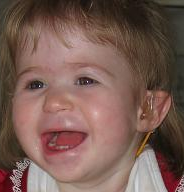1p36 deletion syndrome
(Redirected from Monosomy 1p36 syndrome)
| 1p36 deletion syndrome | |
|---|---|

| |
| Synonyms | Monosomy 1p36 |
| Pronounce | |
| Field | N/A |
| Symptoms | Intellectual disability, developmental delay, seizures, hearing loss, vision problems, hypotonia, distinctive facial features |
| Complications | N/A |
| Onset | Congenital |
| Duration | Lifelong |
| Types | N/A |
| Causes | Genetic deletion on chromosome 1 |
| Risks | |
| Diagnosis | Genetic testing, chromosomal microarray analysis |
| Differential diagnosis | Angelman syndrome, Prader-Willi syndrome, Smith-Magenis syndrome |
| Prevention | |
| Treatment | Supportive care, physical therapy, speech therapy, occupational therapy |
| Medication | Anticonvulsants for seizures |
| Prognosis | Varies; generally involves lifelong management |
| Frequency | 1 in 5,000 to 1 in 10,000 live births |
| Deaths | |
1p36 Deletion Syndrome is a genetic disorder characterized by a deletion of genetic material on the short arm of chromosome 1. It is one of the most common chromosomal deletion syndromes and can lead to a variety of physical, developmental, and intellectual disabilities.
Genetics[edit | edit source]
1p36 Deletion Syndrome is caused by a deletion of a segment of the short arm (p) of chromosome 1. The size of the deletion can vary among individuals, which contributes to the variability in the symptoms and severity of the disorder. The deletion can occur de novo or be inherited from a parent with a balanced translocation.
Clinical Features[edit | edit source]
Individuals with 1p36 Deletion Syndrome often present with distinct facial features, developmental delays, and intellectual disabilities. Common facial features include a flat nasal bridge, deep-set eyes, and a pointed chin. Other physical characteristics may include microcephaly, hypotonia, and congenital heart defects.
Developmental and Intellectual Disabilities[edit | edit source]
Children with 1p36 Deletion Syndrome typically experience significant developmental delays. They may have delayed speech and language development, and many have intellectual disability ranging from mild to severe. Behavioral issues such as autism spectrum disorder and attention deficit hyperactivity disorder (ADHD) are also common.
Neurological and Physical Symptoms[edit | edit source]
Neurological symptoms can include seizures, which occur in a significant number of affected individuals. Physical symptoms may include hearing loss, vision problems, and feeding difficulties.
Diagnosis[edit | edit source]
Diagnosis of 1p36 Deletion Syndrome is typically made through genetic testing, such as chromosomal microarray analysis or fluorescence in situ hybridization (FISH). These tests can identify the specific deletion on chromosome 1.
Management[edit | edit source]
There is no cure for 1p36 Deletion Syndrome, but management focuses on treating the symptoms and providing supportive care. This may include physical therapy, occupational therapy, speech therapy, and educational support. Regular monitoring by a team of specialists is often necessary to address the various health issues that may arise.
Prognosis[edit | edit source]
The prognosis for individuals with 1p36 Deletion Syndrome varies depending on the severity of the symptoms and the size of the deletion. With appropriate interventions and support, many individuals can achieve a good quality of life.
Related Pages[edit | edit source]
Transform your life with W8MD's budget GLP1 injections from $125
W8MD offers a medical weight loss program NYC and a clinic to lose weight in Philadelphia. Our W8MD's physician supervised medical weight loss centers in NYC provides expert medical guidance, and offers telemedicine options for convenience.
Why choose W8MD?
- Comprehensive care with FDA-approved weight loss medications including:
- loss injections in NYC both generic and brand names:
- weight loss medications including Phentermine, Qsymia, Diethylpropion etc.
- Accept most insurances for visits or discounted self pay cost.
- Generic weight loss injections starting from just $125.00 for the starting dose
- In person weight loss NYC and telemedicine medical weight loss options in New York city available
- Budget GLP1 weight loss injections in NYC starting from $125.00 biweekly with insurance!
Book Your Appointment
Start your NYC weight loss journey today at our NYC medical weight loss, and Philadelphia medical weight loss Call (718)946-5500 for NY and 215 676 2334 for PA
Search WikiMD
Ad.Tired of being Overweight? Try W8MD's NYC physician weight loss.
Semaglutide (Ozempic / Wegovy and Tirzepatide (Mounjaro / Zepbound) available. Call 718 946 5500.
Advertise on WikiMD
|
WikiMD's Wellness Encyclopedia |
| Let Food Be Thy Medicine Medicine Thy Food - Hippocrates |
Translate this page: - East Asian
中文,
日本,
한국어,
South Asian
हिन्दी,
தமிழ்,
తెలుగు,
Urdu,
ಕನ್ನಡ,
Southeast Asian
Indonesian,
Vietnamese,
Thai,
မြန်မာဘာသာ,
বাংলা
European
español,
Deutsch,
français,
Greek,
português do Brasil,
polski,
română,
русский,
Nederlands,
norsk,
svenska,
suomi,
Italian
Middle Eastern & African
عربى,
Turkish,
Persian,
Hebrew,
Afrikaans,
isiZulu,
Kiswahili,
Other
Bulgarian,
Hungarian,
Czech,
Swedish,
മലയാളം,
मराठी,
ਪੰਜਾਬੀ,
ગુજરાતી,
Portuguese,
Ukrainian
Medical Disclaimer: WikiMD is not a substitute for professional medical advice. The information on WikiMD is provided as an information resource only, may be incorrect, outdated or misleading, and is not to be used or relied on for any diagnostic or treatment purposes. Please consult your health care provider before making any healthcare decisions or for guidance about a specific medical condition. WikiMD expressly disclaims responsibility, and shall have no liability, for any damages, loss, injury, or liability whatsoever suffered as a result of your reliance on the information contained in this site. By visiting this site you agree to the foregoing terms and conditions, which may from time to time be changed or supplemented by WikiMD. If you do not agree to the foregoing terms and conditions, you should not enter or use this site. See full disclaimer.
Credits:Most images are courtesy of Wikimedia commons, and templates, categories Wikipedia, licensed under CC BY SA or similar.
Contributors: Prab R. Tumpati, MD


